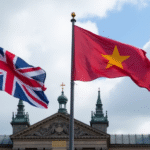Background on Key Figures
Claudia Sheinbaum, the President of Mexico City and a close ally of President Andrés Manuel López Obrador (AMLO), emphasizes sovereignty in her public discourse, advocating for “cooperation, but not subordination” with the United States. Meanwhile, U.S. Senator Marco Rubio plays a significant role in shaping the U.S. policy towards Latin America, focusing on strategic objectives while President Donald Trump handles the tactical aspects.
Shifting Dynamics in U.S.-Latin America Relations
The relationship between the United States and Latin America, as envisioned by Sheinbaum and experienced under Trump, differs considerably. In 2017, Jared Kushner managed U.S.-Mexico relations instead of Secretary of State Rex Tillerson. Today, the U.S. policy towards Latin America is characterized by a bifurcated approach, with Trump and Rubio setting the agenda.
Trump’s Focus on Security and Rubio’s Strategic Objectives
Trump prioritizes security in his dealings with Mexico, while Rubio concentrates on formulating strategic objectives. Trump makes the final decisions, whereas Rubio proposes and negotiates. At times, Rubio has to “swallow hard,” especially during the first few months of Trump’s presidency when the latter withdrew protective measures for Venezuelan migrants.
Sheinbaum’s Proposed Contract for Cuban Doctors and its Implications
Sheinbaum plans to receive Senator Rubio in her office, presenting him with a new contract for Cuban doctors. This contract reportedly offers them housing, chauffeur services, and balanced meals (El Universal, August 31). However, this move raises questions about the Mexican Foreign Ministry’s diplomatic strategies, as there seems to be a lack of coordination between Foreign Minister Juan Ramón de la Fuente and Undersecretary Esteban Moctezuma.
Potential Mexican Officials Without Visa Access
The newly published contract implies that some Mexican officials might lose their visa privileges, including Zoé Robledo, the Director of the Institute of Social Security (IMSS). This situation arises from Sheinbaum’s preference for aligning with authoritarian leaders such as Miguel Díaz-Canel in Cuba, Nicolás Maduro in Venezuela, and Pedro Castillo in Peru, as well as Cristina Fernández de Kirchner in Argentina.
Proposed “Lujo Diplomático” Appointments
Should Sheinbaum proceed with her plans, she might appoint several prominent figures as ambassadors: Gerardo Fernández Noroña to Caracas, Yeidckol Polevnsky to Beijing, and Paco Ignacio Taibo II to Managua. Additionally, AMLO himself might visit Spain.
Key Questions and Answers
- What is the main difference between Sheinbaum’s and Trump’s approach to U.S.-Latin America relations? Sheinbaum prioritizes sovereignty and cooperation, while Trump focuses on security and strategic objectives with Rubio shaping the policies.
- Who are some authoritarian leaders that Sheinbaum prefers aligning with? Miguel Díaz-Canel (Cuba), Nicolás Maduro (Venezuela), Pedro Castillo (Peru), and Cristina Fernández de Kirchner (Argentina).
- What implications does Sheinbaum’s proposed contract for Cuban doctors have? The contract raises concerns about the Mexican Foreign Ministry’s diplomatic strategies and may result in certain Mexican officials losing visa privileges.
- Who are some potential Mexican ambassadors under Sheinbaum’s proposed “lujo diplomático” appointments? Gerardo Fernández Noroña to Caracas, Yeidckol Polevnsky to Beijing, and Paco Ignacio Taibo II to Managua.






